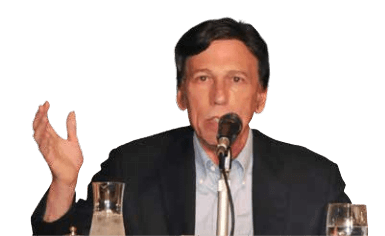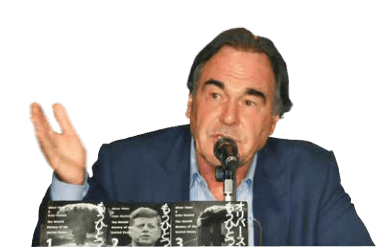Issue:
Director Oliver Stone and historian Peter Kuznick took on conventional beliefs before an SRO crowd at the Club
History according to Stone
by Daniel Leussink
Just like the U. S., Japan is saddled with an “untold history” that needs to be put in the spotlight. The “crooked” and “sanitized” histories of Japan and the U.S. go hand in hand, and are part of a process of obfuscating what really happened.
That was the message of Academy Award winning writer/director Oliver Stone and historian Peter Kuznick, who were at the FCCJ on August 12, promoting their controversial television documentary series, The Untold History of the United States.
In their challenging work, Stone and Kuznick deconstruct a number of “myths:” that the dropping of atomic bombs on Japan ended World War II, that the U.S. won the war in Europe, and that the U.S. was only responding to aggression from the Soviet Union at the start of the Cold War.
Stone, the 66-year-old director of Platoon, JFK and Wall Street, said that the U.S. trashed the memory of both the U.S. and the Soviet sacrifices that really won the war by dropping the atomic bombs on Hiroshima and Nagasaki, effectively ending the war on a dirty note. “In the atomic bombings we find everything that’s wrong with the U.S. today the lying, the denying, the censorship,” he said. “The predominant myth is that the U.S. had to drop those bombs to win the war.”.
The appeal of Stone and Kuznick’s 2012 work was enough to draw a crowd of members and guests to the Club, with 214 people attending and 42 people watching on a live FCCJ website video stream that was freely available for anyone, a first in Club history.
Although Stone and Kuznick did not clarify all of their controversial remarks, some of their comments were met with warm applause from the crowd. Kuznick, director of the Nuclear Studies Institute at American University, described the U.S.- Japan relationship as problematic and denounced U.S. censorship of Japanese press corps coverage of the atomic bombings during the occupation period that ended in 1952.
The U.S. has treated Japan largely as a junior partner for empire building, he said. Kuznick also criticized Japanese Prime Minister Shinzo Abe, the grandson of Nobusuke Kishi, the Prime Minister who concluded the U.S.-Japan Security Treaty in 1960, calling him “one of the worst deniers of real history.” Stone later criticized Barack Obama, Abe’s American counterpart.
Kuznick said that the discussion about Japan’s war atrocities has been about a select set of subjects such as the deployment of comfort women and the occupation of Nanjing, resulting in little discussion, for example, about what happened during the occupation of Southeast Asian nations. He did not exactly specify what he meant with actual examples.
Film director Stone said that although The Untold History of the United States had received a cold reception by the main stream U.S. television stations and newspapers, he was still happy he made the series. “Every time I go out in public, I feel that we’re not alone. We have been rewarded in many ways, and perhaps we will even make a little profit in the end with the DVD sales,” he said. “The movie reinforces my belief that I’m doing the right thing with my life.”
Stone also said he invested private capital in the documentary series, which was aired in the U.S. by the Showtime cable channel. It took five years to make, and is now also available as a 784- page book, in English and Japanese editions. “I’ve been a warrior my whole life,” said Stone, “but now I feel more than ever that I’m a warrior for peace.”
Stone praised 30 year old NSA leaker Edward Snowden for doing the world a great favor, calling him a hero. “Snowden didn’t give away secrets that could hurt our country for profit. He is doing it out of the higher law of consciousness. He sacrificed his life for it,” he said. He pointed out that Obama has essentially institutionalized wiretapping of the entire world, breaking the law despite his legal background. “Obama is a snake. We have to turn on him,” he said.
Kuznick added that the U.S. now sees Asia as the new frontier, because while the U.S. has indicated it will cut back on military spending, Obama has said that there will be no cutbacks in Asia and that he will focus on pivoting the defense posture to Asia.
Stone and Kuznick both said they would like to see Japan reaching out to China in a more positive way. “A way that would get past the crazy nationalism that we see in both countries,” said Kuznick. Stone reiterated that Japan’s interests lie very much with China in the long run. “Don’t look at China as your enemy,” he said. “Start seeing it differently, start by apologizing to China for what you did and all the people you killed in China.”
“It would be like spring,” he added. “China would then suddenly look at Japan a little differently, instead of hating Japan. That would be the beginning.”
In the end, by not specifying exactly in what way Japan should apologize, Stone and Kuznick left untold the history of Japan’s war apologies to many Asian nations.
Daniel Leussink is a Dutch freelance journalist who has been based in Japan since 2007.



